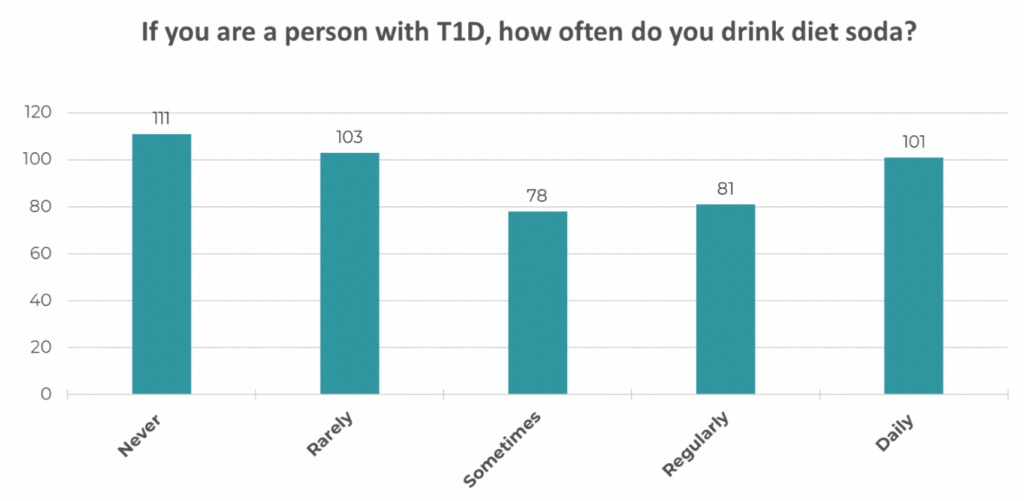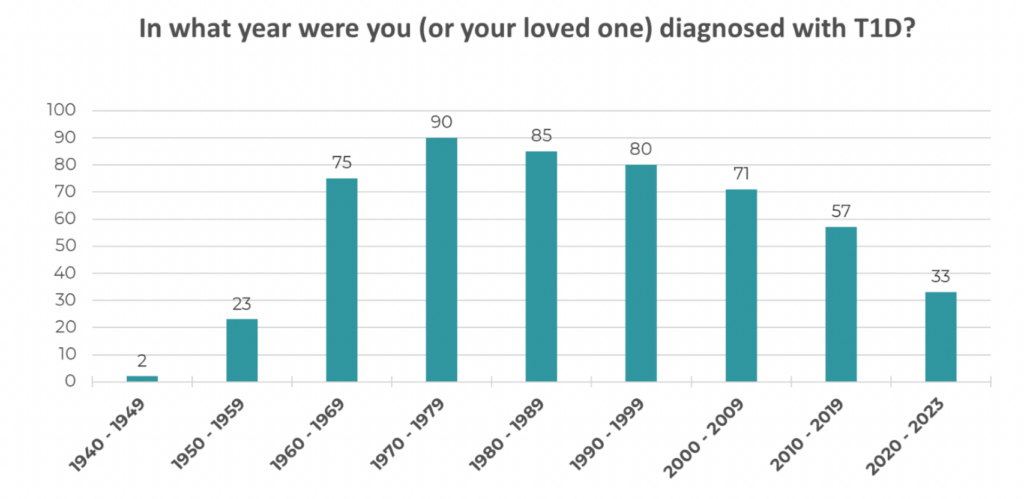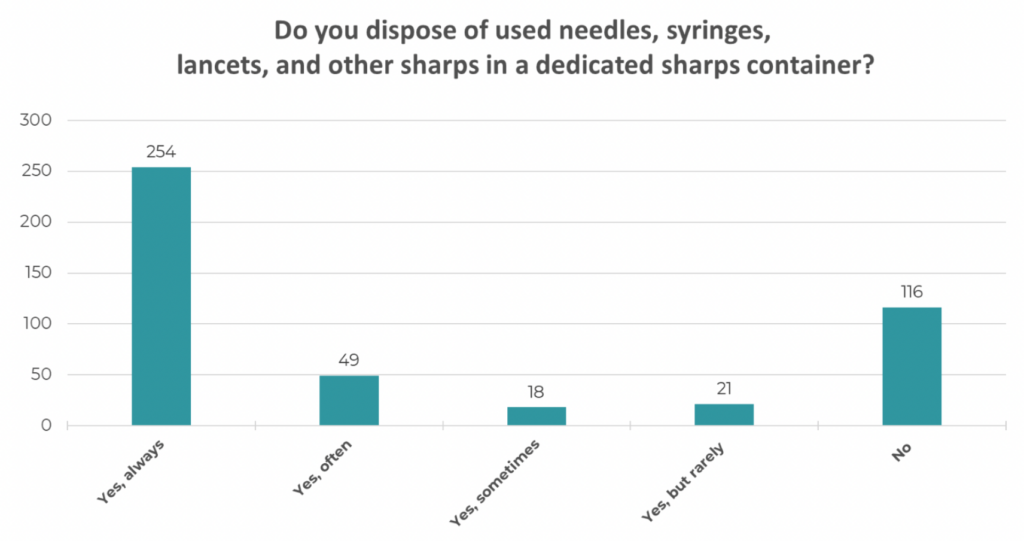
Sign up for a new account.
And get access to
The latest T1D content
Research that matters
Our daily questions
Sign up by entering your info below.
Reset Your Password
Don't worry.
We will email you instructions to reset your
password.
We always learn something new from responses to our Question of the Day. Here is what the community shared this past month about living with T1D.
 If you are a person with T1D, how often do you drink diet soda?
If you are a person with T1D, how often do you drink diet soda?
As people living with T1D, we are taught to avoid drinks that are high in sugar or carbohydrates as it can give us huge spikes in our blood glucose. People with T1D often choose to drink “diet” sodas instead. Our most popular question this month had a heavy split between people who drink diet soda regularly and those who never drink diet soda. The comments share the communities’ thoughts on drinking diet soda and which sodas they prefer!
Popular quotes from the community included:
- “Traditional diet soda raises my glucose. I can’t explain it — aspartame, sucralose, all artificial sweeteners.”
- “I wish I could say zero, but I love the pick me up of a Diet Coke in the afternoon. I have tried no carb sparkling waters and they just aren’t the same. Working on decreasing slowly over time.”
- “49 years with T1D. I used to drink diet soda daily, now less than rarely/never. Times change.”
- “Grew up on Tab before I had diabetes, Loved Diet RC, Switched to Diet Coke, can tolerate Diet Pepsi, after 65 years, I am doing great.”
- “Poison by any other name! Water and coffee are best for me.”
- “I drink several diet cokes (typically a store brand) per day. Doesn’t impact my blood sugar. I am sure the artificial sweeteners aren’t good for you, but I avoid so many foods/drinks because of the impact to my blood sugars that I figure I’m allowed one unhealthy addiction!”
*Comments have been edited slightly for clarity as needed.
 In what year were you (or your loved one) diagnosed with T1D?
In what year were you (or your loved one) diagnosed with T1D?
Our community consists of a diverse age group of individuals living with T1D. The most popular response option was between the years 1970 and 1979, with 17% of the community choosing this response. Some community members were diagnosed in the 1940s while others were diagnosed as recently as this year! We welcome people of all ages, backgrounds, and types of life to join our community and share their insights about living with T1D.
Some insightful comments included:
- “In the dark ages – before 1970 – zero technology. My mom is always happy as she learns about every new tech for T1D, because we navigated the unknown together and survived!”
- “I was dx in April 1955, age 8, after measles, chickenpox, and rubella, all within three months.”
- “It was 1954, after a summer of riding my bike seven miles to teach tennis to kids at a day camp. Do not know how I got through that, but in September, I got to go to Joslin to learn how to stab oranges. I feel very lucky to have gotten some of my ‘training’ from the doctor who started the clinic!”
- “Started showing the classic symptoms (polydipsia, polyuria, polyphagia) in late November 1962 at age 8, a few months after having the mumps.”
- “1980 at age 32. I was told that it was very rare for someone my age to develop type 1. Since then, I have met tons of people in their 30s and older who were diagnosed as such. So much for being considered rare!”
*Comments have been edited slightly for clarity as needed.
 Do you dispose of used needles, syringes, lancets, and other sharps in a dedicated sharps container?
Do you dispose of used needles, syringes, lancets, and other sharps in a dedicated sharps container?
For this question, “sharps container” includes heavy-duty plastic containers such as an empty laundry detergent bottle or plastic coffee container.
The amount of “trash” that comes with living with T1D can get out of hand sometimes! We are taught at diagnosis to dispose of our needles, syringes lancets, and other sharps in a sharps container. This month’s third most popular question breaks down how often our community appropriately disposes of their sharps. The most popular response was “Yes, always,” with 54% of responses. As you can see from the results, our community does a great job of properly throwing out their sharps!
Here is how our community responded:
- “I return all used needles to the pharmacy for waste management.”
- “I dispose of all needles (even if not used) in a sharps container. The state I live in requires that I use a said sharps container (with all the proper labeling, etc.), and it cannot be thrown in the trash. I either must use a service (like Stericycle) or drive to the dump that accepts medical waste a few times a year.”
- “My community has a sharps container exchange program through the fire department. I drop off my full container and get a new empty one.”
- “I collect in any thick plastic container. Then I follow my state’s law to wrap in tape to secure the lid, mark with SHARPS. it can then go in the regular trash.”
- “Putting sharps in the regular trash is not allowed in my area. I use a large, dedicated sharps container under my bathroom sink with pre-paid return shipping. I’ve been working on filling it up for ~12 years.”
*Comments have been edited slightly for clarity as needed.
Are you interested in suggesting a topic for Question of the Day? We welcome the T1D Exchange Online Community members to make suggestions for potential Questions of the Day. Please keep in mind that we ask questions geared toward people living with T1D and their loved ones. We look forward to hearing your input and getting further involved with our community.
Click here to suggest a question now!







